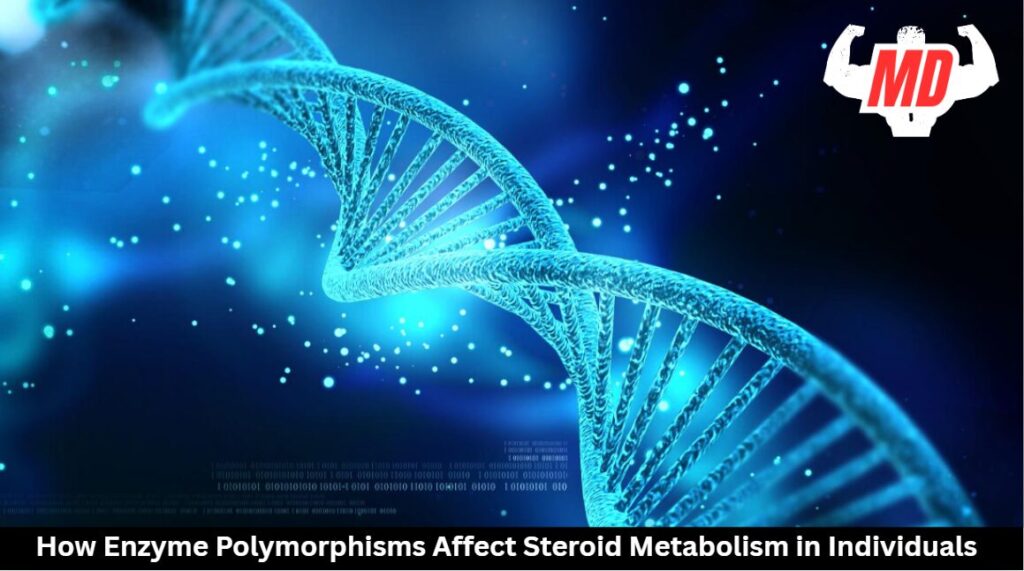Enzyme polymorphisms in your body create unique metabolic patterns that affect how you process steroid hormones. These genetic variations in enzymes like CYP3A4, CYP19A1, and 5α-reductase can increase or decrease hormone conversion rates by up to 30% across different populations. You’ll experience varied responses to medications, stress, and hormone therapy based on your specific enzyme profile.
The Genetic Basis of Enzyme Polymorphisms in Steroid Pathways
While all humans share the same basic steroid metabolism pathways, the genetic variations in our enzyme-coding genes create significant differences in how we process hormones. These enzyme polymorphisms occur through several mechanisms, including single-nucleotide polymorphisms (SNPs), insertions, deletions, and copy number variations.
Variations particularly influence your steroid metabolism in cytochrome P450 enzymes, which are responsible for key transformation steps in hormone processing. When these genetic variations alter enzyme structure or expression, they directly impact hormone regulation throughout your body.
Some polymorphisms increase enzyme activity, accelerating steroid breakdown, while others reduce function, potentially leading to hormone accumulation. These differences explain why individuals respond differently to medications, stress, and even have varying risks for hormone-dependent conditions.

Key Polymorphic Enzymes and Their Effects on Hormone Levels
Several critical enzymes exhibit polymorphisms that greatly alter steroid metabolism and hormone levels throughout your body. CYP3A4 variants can notably change how quickly you metabolize cortisol, while CYP19A1 (aromatase) polymorphisms affect your estrogen conversion rates. These genetic markers often explain why you might respond differently to the same medication than others.
Your hormonal balance depends heavily on 5α-reductase variants, which determine testosterone conversion efficiency to DHT. Similarly, UGT2B17 polymorphisms influence testosterone excretion rates, sometimes complicating athletic drug testing protocols.
Pharmacogenomics research now focuses on identifying these enzyme polymorphisms to predict drug responses and side effects. Understanding your specific enzyme variations may soon become standard practice for personalizing treatment approaches for hormone-related conditions.

Clinical Implications of Altered Steroid Metabolism
Changes in steroid metabolism caused by enzyme polymorphisms have a direct effect on clinical outcomes in many medical conditions. When your enzymes that break down cortisol are different, you might respond to stress in strange ways and be more likely to get metabolic disorders. Polymorphisms that change how the body breaks down testosterone can also change your risk of prostate problems, muscle-wasting disorders, and fertility problems.
Healthcare providers now know that differences in enzymatic activity call for different treatment plans for each person. For example, standard dosing guidelines for hormone replacement therapy often don’t work for people with unusual metabolism.
Depending on your genetic profile, you might respond well to some medications or have bad side effects. These differences in health outcomes show how important pharmacogenomic testing is for diagnosing and treating hormone-related conditions. It allows for more precise interventions and better clinical management.

Ethnic and Population Differences in Steroidogenic Enzyme Variants
Across diverse human populations, significant variations exist in steroidogenic enzyme polymorphisms, creating distinct metabolic profiles that influence hormone processing. You’ll find notable differences in CYP19A1 (aromatase) variants, which affect estrogen production rates between Asian, African, and European populations. These polymorphisms can alter metabolism pathways by up to 30% in some groups.
The CYP3A4 enzyme shows particularly high variation among ethnic groups, with certain variants occurring in over 60% of East Asian populations but less than 10% in European descendants. These differences explain why identical hormone therapies produce varied responses across populations.
Diagnostic Approaches and Personalized Treatment Strategies
Identifying enzyme polymorphisms through advanced diagnostic techniques forms the cornerstone of personalized steroid metabolism treatment. You’ll find that genetic testing can reveal your specific CYP450 variants, allowing healthcare providers to predict your metabolic rate before prescribing steroid medications.
These diagnostic tools now include next-generation sequencing and metabolomic profiling that detect even subtle enzyme variations affecting hormone processing. Your treatment can be tailored based on your genetic profile. Physicians may adjust dosages, select alternative medications, or implement monitoring protocols that account for your unique response.
This personalized approach reduces adverse effects while maximizing therapeutic benefits. For conditions like congenital adrenal hyperplasia or PCOS, enzyme polymorphism testing helps clinicians develop targeted interventions that address the specific metabolic pathways affected in your body.
Frequently Asked Questions
Can Enzyme Polymorphisms Be Modified Through Lifestyle Changes?
No, you can’t modify your enzyme polymorphisms as they’re genetically determined. However, you can influence how these enzymes function through diet, exercise, and avoiding certain medications that affect enzyme activity.
How Do Environmental Toxins Interact With Steroid-Metabolizing Enzyme Variants?
Environmental toxins can inhibit or enhance your enzyme variants’ activities, potentially worsening hormone imbalances if you’ve got vulnerable polymorphisms. They’ll often compete for the same metabolic pathways, creating unpredictable steroid processing in your body.
At What Age Do Enzyme Polymorphism Effects Become Noticeable?
You’ll notice enzyme polymorphism effects from birth, though they become more pronounced during puberty when steroid hormone production increases. Some variations only manifest clinically during adulthood or when exposed to specific medications or stressors.
Can Pregnancy Temporarily Alter Enzyme Function in Steroid Metabolism?
Yes, pregnancy can temporarily alter your enzyme function in steroid metabolism. Your body increases certain enzymes to produce more hormones needed during pregnancy, while inhibiting others to maintain proper hormone balance.
Do Enzyme Polymorphisms Affect Over-The-Counter Supplement Effectiveness?
Yes, your enzyme polymorphisms can markedly affect OTC supplement effectiveness. They’ll influence how your body processes ingredients, potentially making supplements more or less effective than expected based on your unique genetic profile.



